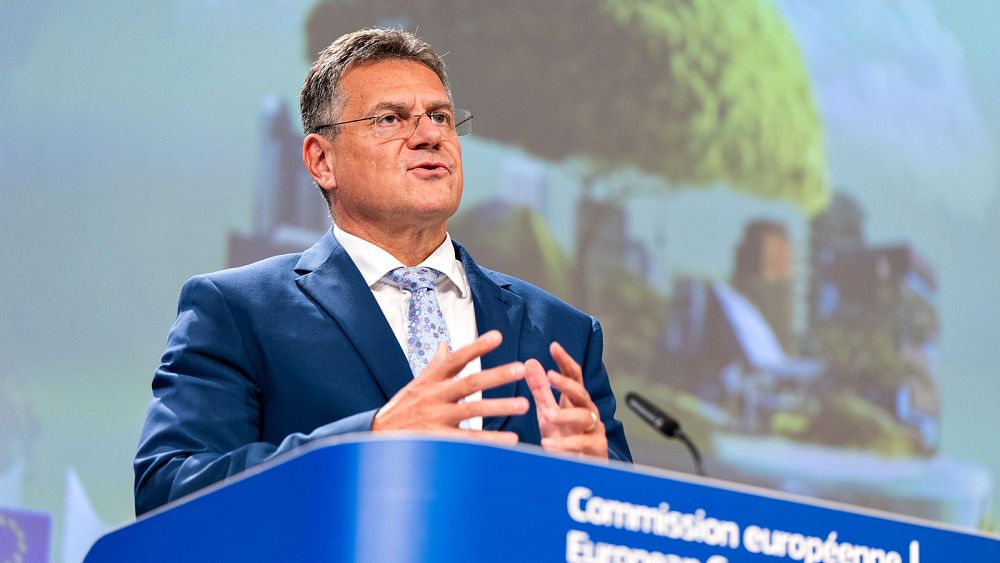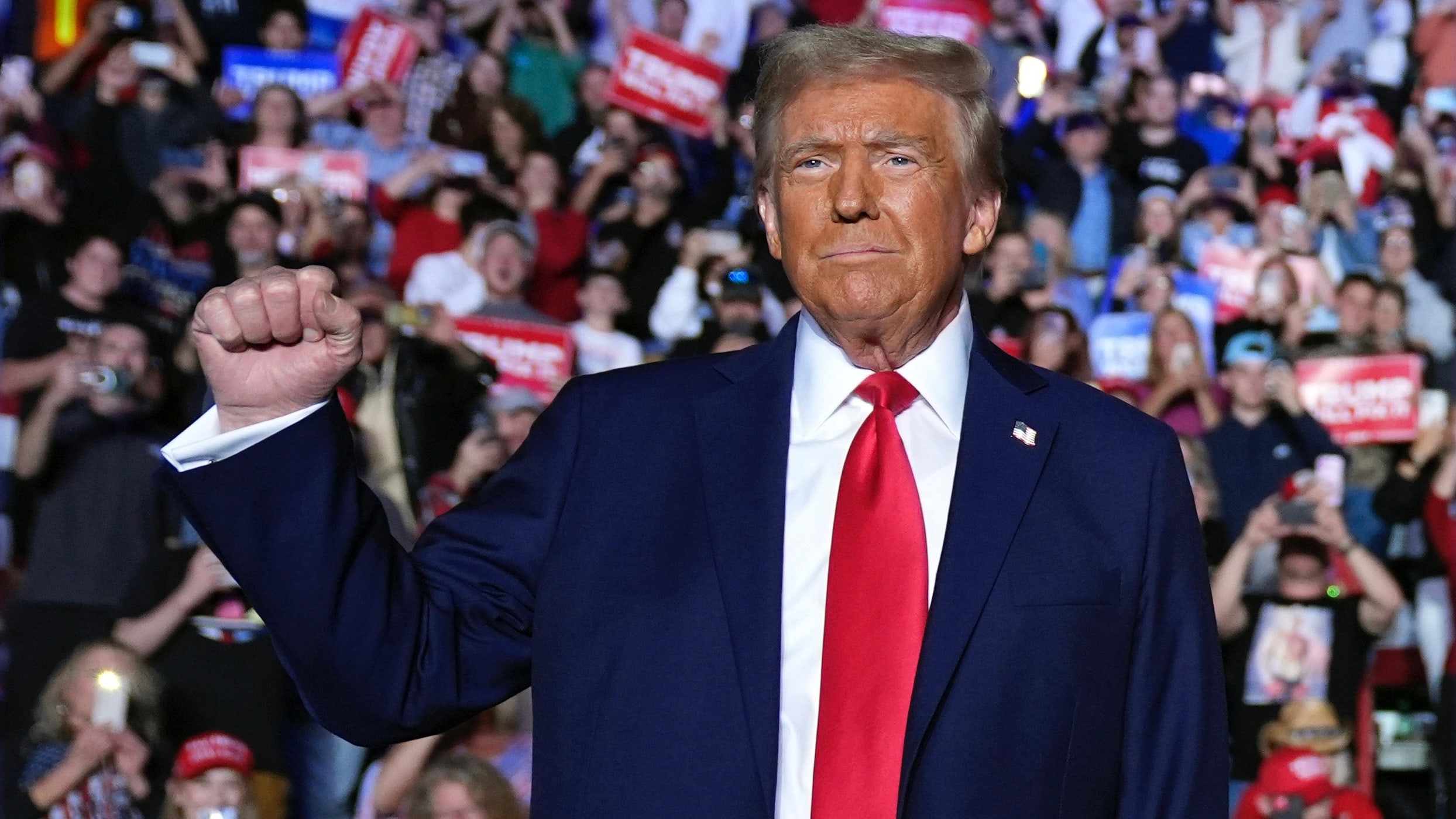World
Rolling out the Green Deal will be ‘challenging,’ says Maroš Šefčovič

Maroš Šefčovič, the European Union’s new climate czar, predicts implementing green legislation will be a hard task for the 27 member states.
“We’re in a new phase because until now we’ve been focusing a lot on legislative work so I think we built this new political but also legislative framework for the Green Deal,” Šefčovič told Euronews in an interview recorded on Tuesday.
“Now we’re approaching the phase that should be equally challenging, if not more, and this is the roll-out, this is proper implementation, this is how to make sure that this climate transition will be done in a socially fair (way), that it will help our industry to be the top competitor on the global markets.”
Over the past couple of years, the EU has passed a raft of transformative laws to slash greenhouse gas emissions by at least 55% before the end of the decade, including a gradual ban on the combustion engine, a border tax on polluting imports and new beefed-up targets for energy efficiency.
On top of that, the bloc has introduced far-reaching plans to wean itself off Russian fossil fuels and ramp up the deployment of renewable systems. The European Commission estimates the effort will require €620 billion annually in additional investments.
“To put (this) in practice, I think will be as challenging as the work we’ve been doing now,” Šefčovič said.
But, he noted, failing to take action would be “the worst possible solution.” The vice-president suggested the executive should, by early next year, propose an “interim” target to further reduce greenhouse gas emissions by 2040, without specifying a percentage level. As of today, the EU only has legally binding goals for 2030 and 2050, when climate neutrality is supposed to be achieved.
“Let’s look at this summer. Let’s look at last summer. Last summer we saw what was terrible. This summer it was much worse,” Šefčovič went on, referring to recent natural disasters, such as the devastating floods in Slovenia and the raging wildfires in Greece.
“We have to behave responsibly. We have to engage more with all stakeholders and we have to work hard to make sure that we manage these three overarching goals: be socially fair, tackle climate change and make our industry competitive.”
A renewed focus on industry
Šefčovič was speaking with Euronews in one of his first TV interviews since being promoted to Executive Vice-President in charge of the European Green Deal, taking over Frans Timmermans, who last week resigned to lead a centre-left alliance in the forthcoming general election in the Netherlands.
With the reshuffle, European Commission President Ursula von der Leyen tried to preserve the delicate political balance in her college: the overarching green portfolio is therefore left in the hands of the socialist group, while the job of climate diplomacy and finance is turned into a separate role, possibly for the conservatives. Until his departure, Timmermans was the highest-profile socialist politician in Brussels, together with Josep Borrell, the EU’s foreign policy chief.
While less outspoken than his Dutch predecessor, Šefčovič has made a name for himself after years of working across the EU’s halls of power and is seen as a safe pair of hands who can handle a variety of policy assignments. In 2019, von der Leyen appointed him as Vice-President for interinstitutional relations and foresight and he was later given the extra tasks of managing the EU-UK relations in the post-Brexit era and spearheading a novel initiative to help member states purchase gas supplies jointly.
Working closer with the private sector, he says, will be among his top priorities.
“A very important issue will be to work very closely with our industry,” Šefčovič said. “I would like to introduce a series of, I would say, structured roundtables with the industries which would be the most affected by the green transition, which are under a lot of pressure from international competitors.”
The approach reflects the anxiety unleashed across the continent as a result of the Inflation Reduction Act (IRA), an initiative introduced last summer by US President Joe Biden that offers generous tax credits, rebates and subsidies to producers of green technology – as long as manufacturing takes place on North American soil.
The IRA has triggered fears of an industrial exodus across the Atlantic Ocean and an irreversible loss of competitiveness for the European economy. In a countermove, the European Commission unveiled earlier this year a new industrial strategy to drastically boost the domestic production of key components, such as batteries, wind turbines, solar panels and heat pumps. The legislation is still under negotiations.
“Our industry should know that we are here to fight for them. We want them not only to stay but to prosper in Europe,” Šefčovič said.
While the idea of establishing industry roundtables is still in the early stages, the vice-president flouted one possible module that could bring together power plants and energy-intensive sectors. This “could be very, very useful because by 2050 we would need probably 3.5 times more electricity than we have right now.”
In response to recent comments made by some European leaders, including French President Emmanuel Macron and Belgian Prime Minister Alexander De Croo, in which they asked for a “pause” in climate legislation, Šefčovič said another of his priorities would be to decrease the administrative burden “as much as possible.”
“I understand that this green transition and tackling climate change, it’s not easy,” he said. “It’s not easy for our citizens, for households, for industries, and for our member states. And I have full sympathy.”

World
Girls5eva Cancelled at Netflix

ad
World
Christmas trees in Germany were decorated with apples instead of ornaments in the 1600s for 'Adam and Eve Day'

The choosing and decorating of a Christmas tree to display during the holiday season is a beloved tradition with a long history.
Today, Christmas trees are often decorated with an array of ornaments, including glass ones, homemade creations, candy canes, tinsel and sparkling lights, but that was not always the case. There was a time in history when Christmas trees were adorned with edible items, including apples, to commemorate the feast of Adam and Eve on Dec. 24.
Germany is credited with starting the tradition of the Christmas tree, according to History.com, with 16th century records telling of Christians bringing trees into their homes for the holiday.
Christmas trees were not always decorated with a large array of ornaments. During the early days of the Christmas tree, they were instead covered in red apples. (iStock)
PRESIDENT FRANKLIN D. ROOSEVELT SOLD CHRISTMAS TREES TO LOCAL RESIDENTS ON HIS OWN ESTATE IN THE 1930S
The Christmas tree has evolved over time, especially in the way in which it is decorated.
In the 1600s, it was typical for a Christmas tree to be decorated using apples, according to the National Christmas Tree Association.
The feast of Adam and Eve, held on Dec. 24, was honored by a “Paradise Play,” which told the story of Adam and Eve.
The play featured a “Paradise Tree,” according to the website, The Catholic Company, which was decorated with apples.

Apples were placed on the “Paradise Tree” used in the play telling the story of Adam and Eve. (iStock)
HOW TO SAY ‘MERRY CHRISTMAS’ IN 10 LANGUAGES TO FRIENDS AROUND THE WORLD
It was popular in Germany to set up “Paradise Trees” in homes, according to several sources, including Britannica and CatholicProfiles.org.
Then, in the 1700s, evergreen tips were hung from the ceilings of homes, also decorated with apples as well as gilded nuts and red paper strips, according to the National Christmas Tree Association.
It was not until the 1800s that the Christmas tree made its way to the United States by German settlers, according to the source.

Today, families cover their Christmas trees in a variety of festive ornaments. (iStock)
At this time, Christmas trees were not the large displays they are now, and they simply sat atop a table, per the National Christmas Tree Association.
Then, in the mid-1800s, trees began to sell commercially in the U.S. By the late 1800s, glass ornaments became a common decoration for the Christmas tree, according to the National Christmas Tree Association.
Today, every family has their own traditions and preferences when it comes to decorating the Christmas tree.
Some go with a very complimentary design, sticking to a single or couple of colors. Others opt for a mix-matched arrangement, combining homemade ornaments with more classic ones, as well as colorful lights, ribbon and more.
World
Photos: Armenian Christians in Jerusalem’s Old City feel walls closing in

As Israel’s war on Gaza rages and Israeli attacks on people in the occupied West Bank continue, Armenian residents of the Old City of Jerusalem are fighting a different battle – quieter, they say, but no less existential.
One of the oldest communities in Jerusalem, the Armenians have lived in the Old City for more than 1,500 years, centred around the Armenian convent.
Now, the small Christian community has begun to fracture under pressure from forces they say threaten them and the multifaith character of the Old City – from Jewish settlers who jeer at clergymen on their way to prayer to a land deal threatening to turn a quarter of their land into a luxury hotel.
Chasms have emerged between the Armenian Patriarchate and the mainly secular community, whose members worry the church is not equipped to protect their dwindling population and embattled convent.
In the Armenian Quarter is Save the Arq’s headquarters, a structure with reinforced plywood walls hung with ancient maps inhabited by Armenians who are there to protest what they see as an illegal land grab by a real estate developer.
The land under threat is where the community holds events and also includes parts of the patriarchate itself.

After years of the patriarchate refusing to sell any of its land, Armenian priest Baret Yeretsian secretly “leased” the lot in 2021 for up to 98 years to Xana Capital, a company registered just before the agreement was signed.
Xana turned more than half the shares to a local businessman, George Warwar, who has been involved in various criminal offences.
Community members were outraged.
The priest fled the country and the patriarchate cancelled the deal in October, but Xana objected and the contract is now in mediation.
Xana has sent armed men to the lot, the activists say, attacking people, including clergy, with pepper spray and batons.
The activists say Warwar has the backing of a prominent settler organisation seeking to expand the Jewish presence in Jerusalem’s Old City.

The organisation, Ateret Cohanim, is behind several controversial land acquisitions in the Old City, and its leaders were photographed with Warwar and Xana Capital owner Danny Rothman, also known as Danny Rubinstein, in December 2023. Ateret Cohanim denied any connection to the land deal.
Activists filed suit against the patriarchate in February, seeking to have the deal declared void and the land to belong to the community in perpetuity.
The patriarchate refused, saying it owns the land.
Armenians began arriving in the Old City as early as the fourth century with a large wave arriving in the early 20th century, fleeing the Ottoman Empire. They have the same status as Palestinians in Israeli-occupied East Jerusalem – residents but not citizens, effectively stateless.

Today, the newcomers are mainly boys who arrive from Armenia to live and study in the convent although many drop out. Clergy say that’s partially because attacks against Christians have increased, leaving the Armenians – whose convent is closest to the Jewish Quarter and is along a popular route to the Western Wall – vulnerable.
Father Aghan Gogchyan, the patriarchate’s chancellor, said he’s regularly attacked by groups of Jewish nationalists.
The Rossing Center, which tracks anti-Christian attacks in the Holy Land, documented about 20 attacks on Armenian people and property and church properties in 2023, many involving ultranationalist Jewish settlers spitting at Armenian clergy or graffiti reading “Death to Christians” scrawled on the quarter’s walls.
-

 Business1 week ago
Business1 week agoOpenAI's controversial Sora is finally launching today. Will it truly disrupt Hollywood?
-

 Politics5 days ago
Politics5 days agoCanadian premier threatens to cut off energy imports to US if Trump imposes tariff on country
-
/cdn.vox-cdn.com/uploads/chorus_asset/file/25782636/247422_ChatGPT_anniversary_CVirginia.jpg)
/cdn.vox-cdn.com/uploads/chorus_asset/file/25782636/247422_ChatGPT_anniversary_CVirginia.jpg) Technology6 days ago
Technology6 days agoInside the launch — and future — of ChatGPT
-
/cdn.vox-cdn.com/uploads/chorus_asset/file/25789444/1258459915.jpg)
/cdn.vox-cdn.com/uploads/chorus_asset/file/25789444/1258459915.jpg) Technology4 days ago
Technology4 days agoOpenAI cofounder Ilya Sutskever says the way AI is built is about to change
-

 Politics4 days ago
Politics4 days agoU.S. Supreme Court will decide if oil industry may sue to block California's zero-emissions goal
-
/cdn.vox-cdn.com/uploads/chorus_asset/file/25546252/STK169_Mark_Zuckerburg_CVIRGINIA_D.jpg)
/cdn.vox-cdn.com/uploads/chorus_asset/file/25546252/STK169_Mark_Zuckerburg_CVIRGINIA_D.jpg) Technology5 days ago
Technology5 days agoMeta asks the US government to block OpenAI’s switch to a for-profit
-

 Politics6 days ago
Politics6 days agoConservative group debuts major ad buy in key senators' states as 'soft appeal' for Hegseth, Gabbard, Patel
-

 Business3 days ago
Business3 days agoFreddie Freeman's World Series walk-off grand slam baseball sells at auction for $1.56 million


















